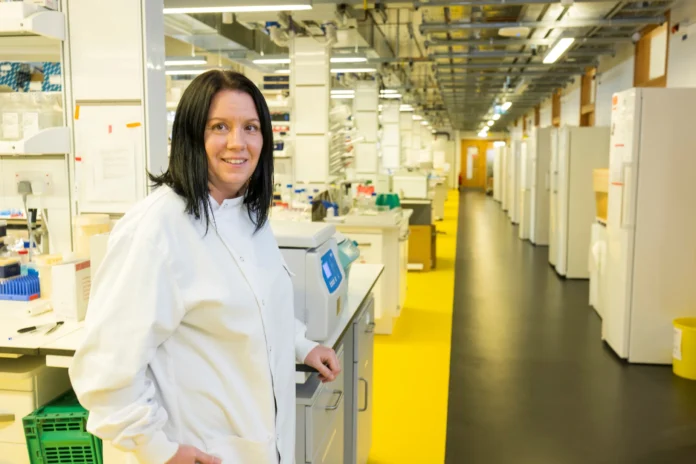Science
University of Galway Unveils Major Breakthrough in Bowel Cancer Immunotherapy

Researchers at the University of Galway have made a significant advancement in the treatment of bowel cancer by uncovering how this disease impairs the immune system and how this process can be reversed. This pioneering study is the first of its kind, and its findings have been published in the Journal for ImmunoTherapy of Cancer (JITC).
The team, led by Professor Aideen Ryan, demonstrated that tumour stromal cells, which support cancer growth, actively inhibit the immune response. By reactivating the body’s own immune cells, known as natural killers (NK) and macrophages, the research opens the door to new immunotherapy strategies for patients suffering from colorectal cancer.
Colorectal cancer is among the most common cancers globally and ranks as the second leading cause of cancer-related deaths. Alarmingly, diagnoses in individuals under 50 have nearly doubled since 1990, with over 2,500 cases reported annually in Ireland alone. Professor Ryan noted, “While immunotherapy has revolutionised care in cancers such as melanoma and lung cancer, it has shown very limited benefit in bowel cancer, leaving patients with advanced disease with few treatment options and poor survival outcomes.”
In their groundbreaking discovery, the research team found that tumour stromal cells are not merely passive components; they actively reprogram the immune system. This occurs through a process where these cells switch off critical immune responses, effectively creating an “immune brake.” The interaction between stromal cells and immune cells involves sugars known as sialoglycans, which bind to receptors called Siglecs on immune cells, leading to a diminished immune response.
The study identified a specific enzyme responsible for producing these Siglec-binding sugars. When the researchers inhibited this pathway using drugs known as sialidases, they observed a reactivation of the immune system, resulting in tumour shrinkage and a reduction in cancer metastasis.
This multidisciplinary research involved collaboration with colorectal surgeons and pathologists at Galway University Hospital, including contributions from Professor Aisling Hogan and Professor Sean Hynes. Additionally, experts from Queen’s University Belfast and Palleon Pharmaceuticals in Massachusetts, USA, participated in the study, providing insights on targeting sialoglycans to disrupt the immunosuppressive interaction.
Professor Ryan highlighted the importance of their findings, stating, “Our research is a clear breakthrough in our understanding of bowel cancer and how immunotherapy could be more successful.” She added, “We have uncovered an entirely new checkpoint, and by focusing on it, we can reactivate the immune system and improve our body’s innate ability to fight the disease, and even target metastasis.”
Michael O’Dwyer, Professor of Medicine and Scientific Director of the University of Galway Cancer Centre, emphasized the significant role of the interplay between cells within a tumour in disease progression. He remarked, “This is an excellent example of impactful, innovative research with strong industry engagement currently being undertaken within the University of Galway Cancer Centre.”
The implications of this research were further acknowledged by Jim Broderick, M.D., Chief Executive Officer and Founder of Palleon Pharmaceuticals, who stated, “The sialoglycan-Siglec axis of immunosuppression in cancer was underappreciated until very recently.” He expressed optimism about the potential of targeting sialoglycan biology to develop new therapies for diseases characterized by immune dysfunction, including cancer.
Professor Ryan’s groundbreaking research is currently featured in the Breakthrough Cancer Research exhibition, titled “Cancer Revolution: Science, Innovation and Hope,” on display in Stephen’s Green Shopping Centre until October 31, 2023. The exhibition showcases striking microscopy images of stromal cells interacting with tumours and a 3D tumour model, illustrating how these cells inhibit the immune response in bowel cancer.
This remarkable study not only enhances the understanding of bowel cancer but also offers hope for improved immunotherapy treatments, potentially transforming the lives of patients affected by this challenging disease.
-

 Top Stories1 month ago
Top Stories1 month agoTributes Surge for 9-Year-Old Leon Briody After Cancer Battle
-

 Entertainment3 months ago
Entertainment3 months agoAimee Osbourne Joins Family for Emotional Tribute to Ozzy
-

 Politics3 months ago
Politics3 months agoDanny Healy-Rae Considers Complaint After Altercation with Garda
-

 Top Stories2 months ago
Top Stories2 months agoIreland Enjoys Summer Heat as Hurricane Erin Approaches Atlantic
-

 World3 months ago
World3 months agoHawaii Commemorates 80 Years Since Hiroshima Bombing with Ceremony
-

 Top Stories3 months ago
Top Stories3 months agoFianna Fáil TDs Urgently Consider Maire Geoghegan-Quinn for Presidency
-

 Top Stories1 month ago
Top Stories1 month agoNewcastle West Woman Patricia Foley Found Safe After Urgent Search
-

 World3 months ago
World3 months agoGaza Aid Distribution Tragedy: 20 Killed Amid Ongoing Violence
-

 World3 months ago
World3 months agoCouple Convicted of Murdering Two-Year-Old Grandson in Wales
-

 Top Stories3 months ago
Top Stories3 months agoHike Donegal’s Errigal Mountain NOW for Unforgettable Summer Views
-

 Top Stories3 months ago
Top Stories3 months agoClimbing Errigal: A Must-Do Summer Adventure in Donegal
-

 World3 months ago
World3 months agoAristocrat Constance Marten and Partner Convicted of Infant Murder









